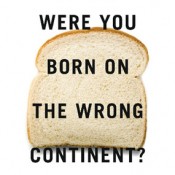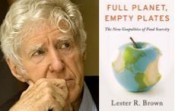Free Forum – RESPONDING TO TRUMP Eddie Kurtz, Courage Campaign – Colby Devitt, Standing Rock First NEW SHOW since 2014. Opens w 15 minute commentary.
Written on January 14th, 2017After hosting and producing this show for 17 years, I stepped away from recording new live interviews nearly two years ago, but I couldn’t resist commenting about Trump’s election and our path forward confronting his administration. The Courage Campaign is spearheading resistance in California with a mix of online and ground organizing and action. Colby Devitt shares her experience at Standing Rock and her work in the campaign to divest from banks funding the pipeline.
Free Forum Q&A – LESTER BROWN, Founder of Worldwatch and Earth Policy Institute author of PLAN B 4.0: Mobilizing to Save Civilization
Written on July 9th, 2015
Originally Aired October 2009
We are in a race between tipping points in natural and political systems.
Which will come first? Can we mobilize the political will to phase out coal-fired power plants before the melting of the Greenland ice sheet becomes irreversible? Can we halt deforestation in the Amazon basin before the forest becomes vulnerable to fire and is destroyed? Can we cut carbon emissions fast enough to save the Himalayan glaciers that feed the major rivers of Asia? Can we win this race?
LESTER BROWN thinks we can…
In his book, PLAN B 4.0: MOBILIZING TO SAVE CIVILIZATION, BROWN lays out the symptoms, the diagnosis, and the cure. He estimates that we could solve all the world’s greatest problems for $200B a year – less than half the US defense budget.
PLAN B 4.0 is a comprehensive plan for reversing the trends that are undermining our future. Its four overriding goals are to stabilize climate, stabilize population, eradicate poverty, and restore the earth’s damaged ecosystems. Failure to reach any one of these goals will likely mean failure to reach the others as well.It’s time for Plan B: an all-out response at wartime speed proportionate to the magnitude of the threats facing civilization.
http://www.earth-policy.org/about_epi/C32
Q&A: THOMAS GEOGHEGAN, Author
Written on January 28th, 2015 |
Q&A: Rebirth of US Manufacturing – James Fallows, Charles Fishman
Written on January 15th, 2015 |
Aired: 03/31/13
I do my best to question conventional wisdom, but I had heard and repeated the fact that the US had lost its manufacturing and it was never coming back so often that I assumed it must be true. But I pick up the December 2012 issue of the Atlantic magazine recently and two articles jump out at me – both declaring that manufacturing is re-emerging. James Fallows writes of US startups exploiting new technologies to speed up the process of design-to-product, and Charles Fishman writes about US corporations like GE moving production back to the US.
James Fallows’ article, Mr. China Comes to America, opens with these words: “For decades, every trend in manufacturing favored the developing world and worked against the Unites States. But new tools that greatly speed up development from idea to finished product encourage start-up companies to locate here, not in Asia.” That got my attention! Charles Fishman’s article The Insourcing Boom goes even a step further. It’s opening words: “After years of offshore production, General Electric is moving much of its far-flung appliance-manufacturing operations back home. It is not alone.”
I make no bones about the fact that I like to report good news, but I don’t want to make nice or play Pollyanna. This information from these reporters strikes me as the real thing and I’m only too glad to admit I may have prematurely buried “made in America”.
James Fallows www.jamesfallows.com
Charles Fishman www.thebigthirst.com
Q&A: LESTER BROWN – FULL PLANET, EMPTY PLATES
Written on December 25th, 2014 |
Aired: 12/23/12
Recorded: 10/17/12
When gas prices were at or near record highs a few months ago in the US, that got people’s attention. What about food prices? Have you noticed them rising? Are you making different choices in the supermarket? If not, it might be because of two things.
One, in America so much of our food is processed, packaged and marketed, that raw commodity prices make up only a fraction of the price of the food we buy. In other countries, especially the less developed ones, an increase in the price of rice or corn can have a major effect on how much a family can afford to eat. Two, Americans spend only 9% percent of their income on food, while millions around the world spend 50-70%. Millions of households now routinely schedule foodless days each week-days when they will not eat at all. A recent survey by Save the Children shows that 14% of families in Peru now have foodless days. India, 24%. Nigeria, 27%.
In his newest book, FULL PLANET, EMPTY PLATES, LESTER BROWN writes,
“The U.S. Great Drought of 2012 has raised corn prices to the highest level in history. The world price of food, which has already doubled over the last decade, is slated to climb higher, ushering in a new wave of food unrest. This year’s corn crop shortfall will accelerate the transition from the era of abundance and surpluses to an era of chronic scarcity. As food prices climb, the worldwide competition for control of land and water is intensifying. In this new world, access to food is replacing access to oil as an overriding concern of governments. Food is the new oil, land is the new gold. Welcome to the new geopolitics of food.”
www.earth-policy.org

